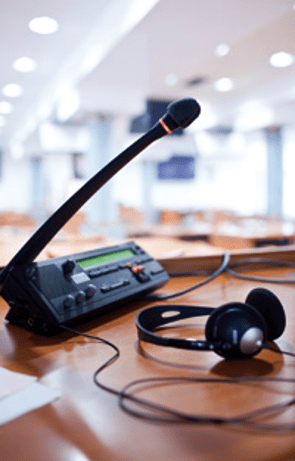1.What interpreting technique to ask for?
Interpreting techniques
Simultaneous interpreting
>Chuchotage
Consecutive interpreting
Liaison interpreting
Sign language interpreting
Simultaneous interpreting

Types of events: meetings, seminars, conferences, symposiums, etc.
The interpreter works from a booth linked to the outside sound and, through headphones, orally translates from one language to another whilst the speaker is speaking.
Simultaneous interpreting: Chuchotage
Is simultaneous interpretation in a low voice, spoken directly into the ear of the receiving person.
The person who interprets is situated at their side, slightly behind, and whispers the interpretation of the original speech to them.
Consecutive interpretation

Types of event: meetings, seminars, courts, press conferences etc.
• Speech of a speaker whose duration ranges from five to ten minutes.
• The interpreter takes notes about the structure of the speech and the main concepts of it.
• The interpreter reads the notes, completing them with information that they have accumulated mentally, and reproduces the speech of the speaker with a similarity to the original of approximately 90%.
Liaison interpreting
Types of events: trade fairs, business meetings, networking events, etc.
The interpreter acts as a linguistic link between two people who cannot master the use of the same language.
Sign Language interpreting
Opportunity!
New service
Sign Language Interpretation

Types of events: interviews, meetings, trainings, appointments, conferences, trade fairs, etc.
Aim: to facilitate communication between people with severe hearing difficulties and other people.
• Services directed to people who suffer hearing difficulties which cause problems of expression and the understanding of spoken language, and who use sign language to communicate.
• Sign language is not universal. It is essential to know what language the interpreter must interpret to.
2. Why is it important to specify the theme or area which the event will be about?
Specifying the theme or the area which the event will be about will facilitate the selection of the professional who will be most appropriate for the service.
3. How many interpreters are needed?
The number of interpreters will depend on the duration of the event (considering that each professional interprets at most 20 minute intervals in a row) and on the number of speakers who are speaking at the time.
For example, for an interpretation of 4 hours, we will need two interpreters to be relieved.
4. Why is the preparation of the interpreter essential?
Interpreting = preparation + oral translation
The interpreter’s preparation using the reference material related to the event is an integral part of the interpreting service and this is included in the daily rate of the interpreter.
The preparation of the interpreter will depend on the success of the interpretation service.
